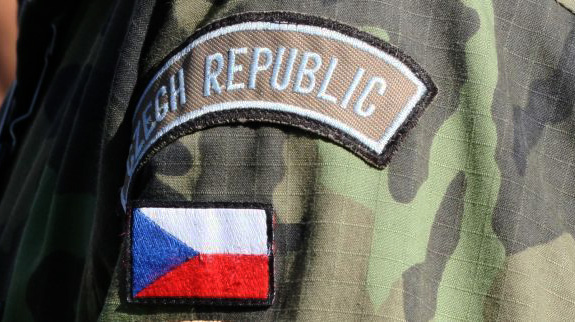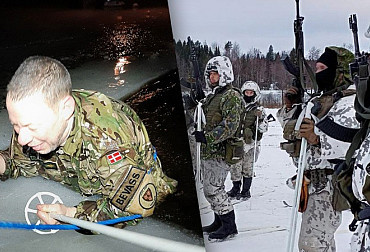Czech Republic to add a billion to defence budget, but growth rate of defence spending is low compared to other countries
The Czech Army, or rather the Ministry of Defence, will manage a higher budget than expected this year. The Ministry of Defence will receive an extra CZK 1 billion compared to the original proposal, so overall it will manage a budget of CZK 89.1 billion this year, which represents 1.35% of GDP. Although this is certainly good news, the overall rate of growth of defence spending in the context of current security threats is objectively insufficient, regardless of the arguments of the Ministry of Defence apparatus, according to which the set processes do not allow for more investment this year. Although the defence budget of the Czech Republic is growing in absolute terms, it will decrease relatively to GDP compared to last year.

Picture: The Czech Army will manage this year with a higher budget than expected. (illustration photo) | Ministry of Defence of the Czech Republic
"With this decision, our Government has made it clear that it is aware of the necessity to do the maximum for the defence of the Czech Republic. Especially in the current situation when the Russian army in Ukraine is showing that nothing is sacred to it," Defence Minister Jana Černochová said recently. It was in response to Russia's invasion of Ukraine that the government adopted Resolution 149 on 2 March 2022 to increase the budget of the Defence Ministry's expenditure chapter by CZK 1 billion to CZK 89.1 billion in 2022. With this resolution, the Government also agreed to further increase the funds for ensuring the defence capability of the Czech Republic.
On the one hand, this is positive news, as the ministry will spend the funds mainly on the purchase of small arms from the Česká zbrojovka, but on the other hand, this increase is rather symbolic in the context of the war in Ukraine and President Putin's threats. After all, one only has to look at other countries which, according to the latest available information, are very serious about defence.
For example, in the recent words of Lithuanian President Gitanas Nausėda, Lithuania needs to spend more money on its defence. Next year, the country will spend at least 3% of GDP on defence, which is 1% more than this year. In other words, it will be an increase of around 50%. Poland is in a similar position. Initially, the military budget was to be increased to 2.3% of GDP in 2023 and to 2.5% of GDP in 2024. However, the Polish ruling Law and Justice (PiS) party is apparently proposing to increase Polish military spending next year to 3% of GDP. Then German Chancellor Olaf Scholz took everyone's breath away by announcing that Germany will 'pump' EUR 100 billion into defence later this year and increase defence spending to over 2% of GDP (German military spending was around 1.6% of GDP last year), with the aim of rapidly bringing its armed forces up to the economic strength of Germany.
Looking across the Alliance, the Czech Republic is still among the countries that are cutting back on defence, either in favour of other spending or in favour of reducing the state budget deficit. Less than the Czech Republic on defence is spent by small Luxembourg with 0.6 per cent of GDP, by Spain, which has been struggling economically for a long time, with 1 per cent of GDP (but in absolute terms it is $14.9 billion, almost four times more than the Czech Republic), by Belgium with 1.1 per cent (again in absolute terms, more, namely $6.5 billion), and Slovenia with 1.3 per cent of GDP. It should also be remembered that although the Czech Republic is trying to increase its percentage of defence spending with the aim of reaching 2 per cent of GDP, this may still not mean more money in the end, as of course it depends on what absolute level of GDP this percentage is calculated from. For example, 1.35% of defence spending for 2022 may mean more money in the end than the desired 2% of defence spending from a possible lower future GDP. The alleged unpreparedness of the Ministry of Defence to spend any increased funds effectively then underlines the whole issue
On the official website of the Ministry of Defence we can read the following: "The ambition to meet the Alliance commitment and reach the 2% of GDP threshold for defence spending by 2025 remains valid. In view of this, the Ministry of Defence will continue to push for an increase in spending for 2023 and the medium-term outlook for 2024 and 2025 to ensure that the budget accelerates modernisation projects in line with the Czech Army's concept documents, led by the order for tracked infantry fighting vehicles." However, despite the above-mentioned concept, given the current risks, it may be time to significantly reconsider the current very slow budget increases and realise that the security of our country is a priority, not a secondary item in the state budget. Thus, certain conceptual changes should be made, it would be advisable to simplify the acquisition process, make the most of existing framework contracts, and encourage recruitment by improving the conditions of service, and the sooner the better. The aforementioned changes are also mentioned in the so-called ten priorities of the Ministry of Defence, which were presented by Minister Jana Černochová at the beginning of the year.




















